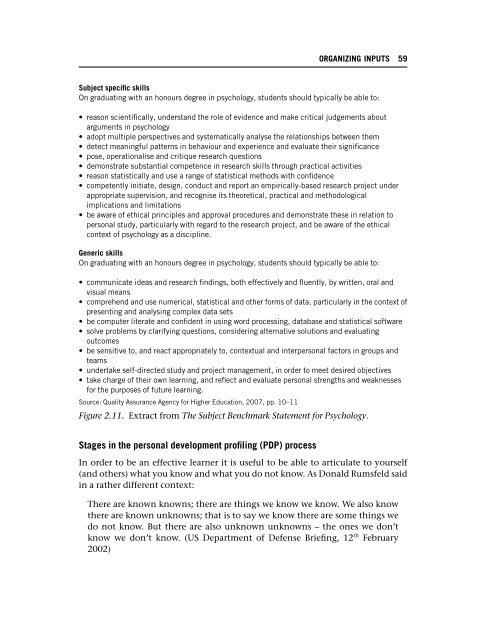Psychology - Forgot your username
Psychology - Forgot your username
Psychology - Forgot your username
Create successful ePaper yourself
Turn your PDF publications into a flip-book with our unique Google optimized e-Paper software.
Stages in the personal development profiling (PDP) process<br />
ORGANIZING INPUTS 59<br />
Subject specific skills<br />
On graduating with an honours degree in psychology, students should typically be able to:<br />
reason scientifically, understand the role of evidence and make critical judgements about<br />
arguments in psychology<br />
adopt multiple perspectives and systematically analyse the relationships between them<br />
detect meaningful patterns in behaviour and experience and evaluate their significance<br />
pose, operationalise and critique research questions<br />
demonstrate substantial competence in research skills through practical activities<br />
reason statistically and use a range of statistical methods with confidence<br />
competently initiate, design, conduct and report an empirically-based research project under<br />
appropriate supervision, and recognise its theoretical, practical and methodological<br />
implications and limitations<br />
be aware of ethical principles and approval procedures and demonstrate these in relation to<br />
personal study, particularly with regard to the research project, and be aware of the ethical<br />
context of psychology as a discipline.<br />
Generic skills<br />
On graduating with an honours degree in psychology, students should typically be able to:<br />
communicate ideas and research findings, both effectively and fluently, by written, oral and<br />
visual means<br />
comprehend and use numerical, statistical and other forms of data, particularly in the context of<br />
presenting and analysing complex data sets<br />
be computer literate and confident in using word processing, database and statistical software<br />
solve problems by clarifying questions, considering alternative solutions and evaluating<br />
outcomes<br />
be sensitive to, and react appropriately to, contextual and interpersonal factors in groups and<br />
teams<br />
undertake self-directed study and project management, in order to meet desired objectives<br />
take charge of their own learning, and reflect and evaluate personal strengths and weaknesses<br />
for the purposes of future learning.<br />
Source: Quality Assurance Agency for Higher Education, 2007, pp. 10–11<br />
Figure 2.11. Extract from The Subject Benchmark Statement for <strong>Psychology</strong>.<br />
In order to be an effective learner it is useful to be able to articulate to <strong>your</strong>self<br />
(and others) what you know and what you do not know. As Donald Rumsfeld said<br />
in a rather different context:<br />
There are known knowns; there are things we know we know. We also know<br />
there are known unknowns; that is to say we know there are some things we<br />
do not know. But there are also unknown unknowns – the ones we don’t<br />
know we don’t know. (US Department of Defense Briefing, 12 th February<br />
2002)






